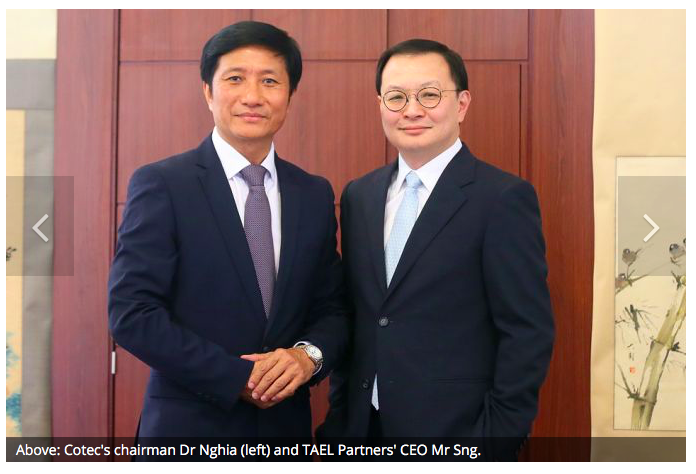Cotec Healthcare shares costs to deliver quality care in Vietnam
 LIFE has not slowed down for Lim Cheok Peng after he stepped down from his managing director post at Malaysian hospital operator IHH Berhad in 2013.
LIFE has not slowed down for Lim Cheok Peng after he stepped down from his managing director post at Malaysian hospital operator IHH Berhad in 2013.
Besides helping to develop Kuala Lumpur's first rehabilitation hospital with Khazanah Nasional, practising in a clinic here and doing consultancy work, Dr Lim also became the vice chairman of Vietnamese hospital developer Cotec Healthcare two months ago.
A subsidiary of Vietnamese real estate firm Cotec Group, Cotec Healthcare has developed a model with the government that is said to be the first of its kind.
Cotec Healthcare builds hospitals on landbanks provided by a reputable public hospital and uses the public hospital's branding and shares medical resources and equipment. The goal is to lower costs such that these hospitals can serve the country's burgeoning middle-class at affordable prices.
"If this works, then other developing countries could potentially adopt the model," Dr Lim said. "I think this is one way of looking at how healthcare costs can be controlled so you don't have duplication of services, through sharing of capital equipment."
Dao Duc Nghia, chairman of Cotec Healthcare and Cotec Group, told The Business Times that in Vietnam, the well-heeled go to private hospitals or abroad for treatment, while the only option for most are public hospitals. (see amendment note)
"I saw the real needs of my fellow Vietnamese," Dr Nghia, who has a PhD in architecture, said. "They have to wait for long hours to consult with a doctor and many patients have to share a bed."
So far, Cotec's model, known as the socialised public and private partnership, has seen some promising results. Its first hospital in Dong Nai province opened its doors in 2015 and became operationally profitable in the first year. A standalone private hospital takes an average of at least three years to break even, Cotec said.
Revenues for the hospital stood at US$20 million at end 2017, and earnings before interest, tax, depreciation and amortisation (EBITDA) in 2017 was at US$4.5 million, with an annual growth rate of more than 50 per cent.
An average stay costs about 50 per cent less than a comparable stay at a private hospital. Doctors at the partner public hospitals also refer those who can afford it to Cotec's hospital next door, helping to ease overcrowding.
Cotec has set its sights on opening hospitals throughout urban areas in Vietnam with at least a population of one million, said Dr Nghia.
Its focus on densely populated areas stems from the fact that patients at his hospitals are covered under social insurance, partly or wholly, depending on the type of treatment.
"We need the largest number of patient counts," Dr Nghia said.
Three other hospitals in Binh Dinh, Hanoi and Nghe An are in the works and will total about 3,000 beds when they become operational by 2019. Cotec is also in talks for two other hospitals, which would bring Cotec's total bed count to over 4,500.
A recent investment by TAEL Partners, a Singapore licensed private equity fund manager which has invested over US$1.5 billion in Association of Southeast Asian Nations (Asean) countries, will give Cotec the potential to build another four more hospitals.
Thanks to a proposal by Dr Lim, who is also chairman of TAEL's healthcare platform, Cotec and TAEL will also build 24-hour satellite clinics in the cities where these hospitals are located.
"These will add as a feeder to decongest the hospitals," he said. "That is another way healthcare costs can be reduced."
Some ideas Dr Nghia has for boosting Cotec Healthcare's offerings down the road include allowing a patient to select his own doctor, and providing professional advice on preventative healthcare.
"We're trying to provide the full package for Vietnamese about nutrition and wellness," he said.
Michael Sng, chief executive and managing partner of TAEL, said: "Healthcare, particularly in the fastest growing markets like Vietnam, will not just provide us with superior financial returns but have a strong social impact and improve the quality of life for our Asean citizens."
By: Yunita Ong
Source: https://www.businesstimes.com.sg/









